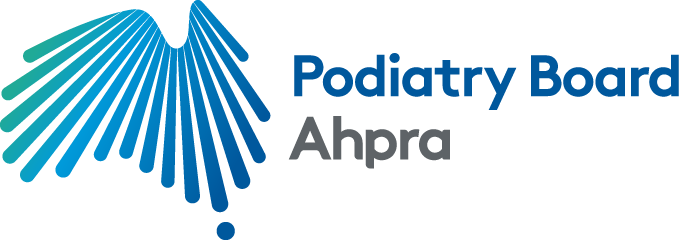Guidance for working with assistants in podiatry practice
| Why | The Podiatry Board of Australia (the Board) has developed this guidance for podiatrists and podiatric surgeons as part of its role to protect the public. This guidance will help you better understand and meet your professional obligations when working with assistants. |
|---|---|
| What | You must be familiar with and meet your professional obligations and standards for safe practice, as outlined in the Board’s Code of conduct, professional capabilities and other regulatory standards and guidelines for the podiatry profession. |
| How | You must always practise in accordance with the Board’s Code of conduct and other regulatory standards, including when working with assistants. |
Why the Board developed this guidance
You must always ensure patients receive safe and person-centred care
The Board publishes guidance, including FAQs and fact sheets as part of its role in protecting the public. This guidance outlines how the Board’s Code of conduct, professional capabilities and other relevant regulatory standards apply when you are working with assistants in your practice. It also provides information about other useful resources to support you when working with assistants to ensure your patients receive safe, person-centred and culturally safe podiatry care.
This guidance provides a summary of your professional obligations when delegating1 tasks to an assistant. It emphasises the importance of quality and safety of care and service.
Your professional obligations
Code of conduct and other professional obligations
The Code of conduct outlines the Board’s expectations for professional behaviour and conduct. You should be familiar with all sections of the code and apply it to your practice. The Board’s Professional capabilities identify the knowledge, skills and professional attributes required to safely and competently practise in Australia. You also have a responsibility to ensure culturally safe healthcare for Aboriginal and Torres Strait Islander Peoples. When working with Aboriginal and Torres Strait Islander peoples consider engaging with an Aboriginal and Torres Strait Islander health worker and/or practitioner to ensure effective communication and cultural safety.
The principles for safe practice and professional conduct set out in these documents as well as other relevant regulatory standards and guidelines for the podiatry profession apply to your practice when working with assistants.
How to meet your professional obligations
Practise in line with the Board’s Code of conduct, professional capabilities and other regulatory standards
You must always put the care of your patients first and practise safely and effectively. The Board expects you to practise in accordance with its Code of conduct, the standards of practice set out in the professional capabilities and other regulatory standards, including when you are working with assistants in your practice.
When working with an assistant you need to ensure:
- you understand that you remain responsible for the overall management and review of the patient to inform decisions to delegate care to an assistant
- you carry out a review of patients receiving care from an assistant on a basis which is appropriate to the individual patient’s risk status
- you have appropriate professional indemnity insurance (PII) arrangements in place for all aspects of your podiatry practice, including when working with assistants. Your PII provider can advise you about your PII cover
- the assistant is appropriately trained,2 experienced, skilled, and competent to safely carry out the tasks you delegate to them
- you regularly assess the knowledge, skills, and competence of the assistant and remain responsible for ensuring they carry out relevant professional development when required
- it is safe and appropriate for the podiatry care to be provided by an assistant within the relevant clinical setting
- the patient has provided consent for the assistant to provide the care
- the patient is aware of any financial implications including changes in costs or reimbursement when the care is provided by an assistant, and
- the assistant understands their professional obligations with respect to:
- effective communication with patients from diverse groups
- providing evidence-based and person-centred care
- providing culturally safe care to Aboriginal and Torres Strait Islander People
- informed consent
- confidentiality and privacy
- recognising when to stop a task and escalate clinical concerns to the podiatrist or podiatric surgeon
- continuity of care, and
- maintaining appropriate and accurate health records.
Other resources to help you
You should use professional judgment when selecting resources to guide your practice. Resources you may find helpful to support you when working with assistants include:
- Victorian Department of Health - Supervision and delegation framework for allied health assistants
- Queensland Health - Allied Health Assistants and Delegation
- National Code of Conduct for Healthcare Workers (Queensland)
Professional associations can also provide guidance about working with assistants in your podiatry practice.
Review
This guidance will be reviewed as needed, but generally every three years.
- Defined in the Code of conduct as: Delegation involves one practitioner asking another person or member of staff to provide care on behalf of the delegating practitioner, while that practitioner retains overall responsibility of the care of the patient.
- Training may include appropriate and relevant on-the-job training and/or formal qualifications, with preferred qualifications being a Certificate III or Certificate IV in Allied Health Assistance or equivalent course.

